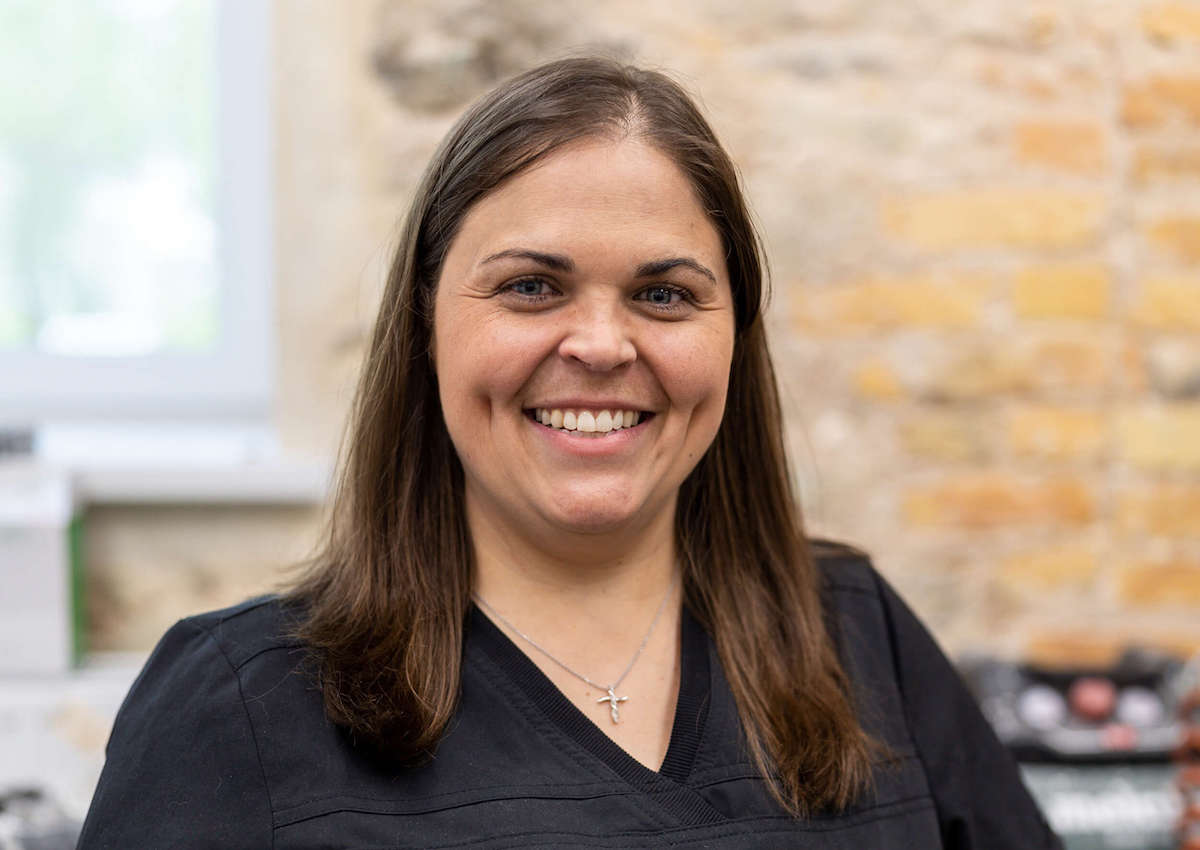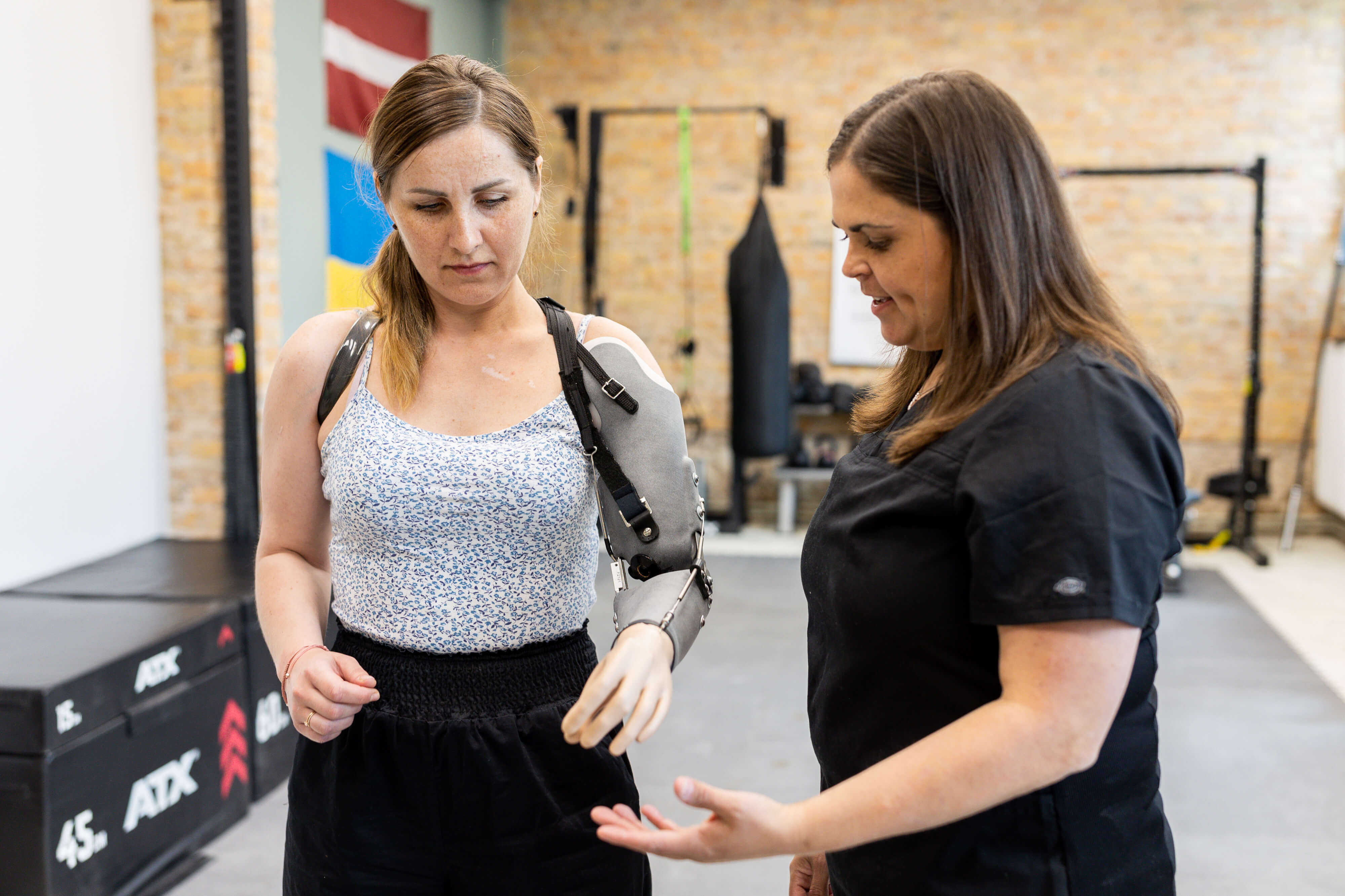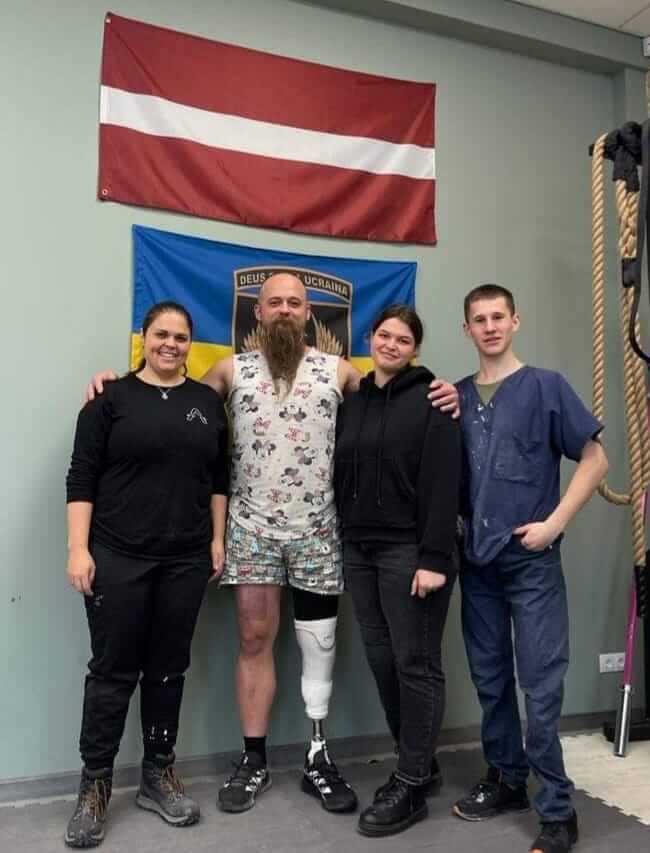Katie Leatherwood ('09)
 Katie Leatherwood (LETU ‘09) is a Certified Prosthetist and Orthotist with a passion to share the love of Jesus Christ with people affected by disability. Using her knowledge in prosthetics, orthotics, and disability awareness, Katie seeks to engage this community through physical intervention, emotional encouragement, and spiritual discipleship.
Katie Leatherwood (LETU ‘09) is a Certified Prosthetist and Orthotist with a passion to share the love of Jesus Christ with people affected by disability. Using her knowledge in prosthetics, orthotics, and disability awareness, Katie seeks to engage this community through physical intervention, emotional encouragement, and spiritual discipleship.
After graduating from LeTourneau University with a degree in Kinesiology (Exercise Science), Katie went to graduate school and earned a Certification in Prosthetics and Orthotics (CPO). She worked full-time in the field of Prosthetics and Orthotics since 2009, before moving to Latvia in 2015. Her organization, Designed To Live, exists to inspire people whose lives have been affected by a disability and help them regain meaning and significance in their lives and be able to live beyond their disability.
The NOW team had the chance to chat with Katie in 2023 and learn more about what God is doing through her work in Latvia. We hope you enjoy the following highlights from that conversation.
Your LETU experience actually started as an engineering major. What things were different when you switched majors, and what things did you feel remained constant throughout the whole time?
I switched from biomedical engineering to kinesiology at the end of my sophomore year. One thing that remained constant was the support of the professors. Dr. Gonzalez was my advisor when I was biomedical engineering. So going into BME, the LEGS (LeTourneau Engineering Global Solutions) program had just released, and I was interested. That is what prompted me to study biomedical engineering. My aim was to be in this program. To do that, biomedical engineering was the gateway. I expected biomedical engineering to deal with more of the medical side instead of solely being engineering, but I was mistaken. Instead, it was very heavy on the engineering. I eventually realized that I was not an engineer, but I did like the medical end and I wanted to work with people. I went to Dr. Gonzalez's office and told him I was ready to change majors. He told me it was not time yet, but to come back in a few days and have a report of why I wanted to change majors. I went back, he read it, and he approved. When I switched to kinesiology, my new advisor, Dr. Jacobs
was also very supportive. He asked me what my goals were and made me feel welcomed. I really appreciated the professors being very encouraging and helping me with this change.
You have covered a lot of ground since your time at LETU. Did you immediately have a pathway after graduation that fed into the kinesiology field?
Before graduation I had the opportunity to be on a senior design team called the LEGS project, working with prosthetic legs, specifically knee joints. At the time I joined, they added the science (kinesiology) team. I was the team lead for the science team using kinesiology as well as biology. I eventually went to Kenya and was exposed to the great need and impact for prosthetics globally. I realized that I wanted to form a career around prosthetic care.
I had been involved with international missions growing up. My family went to many countries on mission trips. The student research trip to Kenya was not just a trip. It was life-changing to see the patients traveling for days just to get new prosthetics and how important it is for their independence in life. I went to Jordan four years ago and used a LEGS knee to fit ten patients. I was able to use the knee that I did research on for actual patient care. That’s not usually the case for student research projects but in my case, I actually got to see it being used in the real world. It was a very cool experience. It allowed me to see the connections between the science and the practical application. We had seen on the paper, the numbers say that this knee works, but does it really? In Kenya, we were there for the research, but once we got to talk with the people, those relationships became most important to us. I keep in contact with a few of the people that I met on the trip. I've sent one of the patients a few prosthetic parts because I now have access to them. It was life-changing because I can say that they were my very first prosthetic patients. I'm doing what I'm doing today because of that trip, because of the LEGS program, because of LeTourneau University.
What has your journey looked like between your experience in Kenya and where God has brought you now?
At LeTourneau, I remember hearing multiple times that we all have a God-given skill, you develop that skill, and then you take it to the mission field. It was discussed a lot; you get a skill, you get good at it, and then you take that on the mission field which initially becomes your calling. During my professional training, the patient rooms at my prosthetic clinic in Texas were my mission fields. If you're planning to go overseas and international long term on the mission field, you can’t just go right out of college and expect to be very useful. If this is your end goal, you need to educate yourself on your skill and grow. This way, you can be more useful when you go. I had a mentor in prosthetics that basically told me the same thing. He told me not to leave yet even though I had finished my residency. I needed to work at least five years in the field full time seeing patients in a controlled area like the USA. If I decided to go somewhere where it is not so controlled with limited resources, I would then be able to reflect on my experiences and adapt them. I was ready to go and wanted to do this, but I did have many people tell me to wait. They said that God would use me during that time where I was and that it would not be wasted time. When I got to the point where God wanted me, He would use me even more when he sent me to where He wanted me to go.
In Texas, I worked for about seven years full time doing prosthetics at Hanger Clinic, one of the largest prosthetic corporations in the U.S. Because of privacy laws, I could talk with the patient about anything behind closed doors. I was able to have such deep faith conversations during that period. That definitely was my mission field at the time. Later, the doors opened for me to go to Latvia.
So I came to a point in my career where I asked God to use me in a greater way. Going back a bit, I did get caught up in the success and career status ladder. Before I began my professional career, I had committed to God that I wanted to learn and gain experience so I could go further serving Him with a greater impact. After several years of climbing the career ladder and gaining material possessions, I was at the top and realized I wouldn’t be here without God’s provisions and opportunities. I had a come- to-Jesus moment and realized I succeeded in my career, but that wasn’t my goal. I was at a point where I had experience, I had knowledge, and I had the skills. What was next? I loved my job in Texas, but my ultimate goal starting this career was not to be comfortable and have all these things. I prayed and began looking for the next place God would use me. I knew I had the skills to be used in areas that were less resourced with prosthetics. It was about a two-year process of looking, praying, and seeking advice. I talked with many organizations, but most said no because I wasn’t a doctor, nurse, or dentist. I got this answer for about a year and a half. I knew this was God’s calling on my life so I didn't take those nos as a stopping point. I continued searching and praying. My church in Texas had a partnership with a church in Latvia. One year I went to Latvia on vacation. During that time, I wanted to meet with different people, present the idea of God’s calling on my life, present my skills, and ask what their thoughts were. I met with people in the government, people that worked at university level, people in churches, and other organizations. Some thought this plan was a good idea, some didn’t. I came back to the U.S. and continued working for another year until I got connected with an organization in Latvia that said they would give me a chance. Things have changed a lot since then. I wouldn't have thought of going to Latvia for prosthetics, but God definitely did and he knew that was where I needed to be.
 Tanya is from Mariupol in Ukraine and lost her arm when a Russian shell hit her home. Her father also died in this same bombing. Tanya is being fit with a 3D printed, body-powered prosthetic arm that allows her to have independence in her life and work.
Tanya is from Mariupol in Ukraine and lost her arm when a Russian shell hit her home. Her father also died in this same bombing. Tanya is being fit with a 3D printed, body-powered prosthetic arm that allows her to have independence in her life and work.
Photography by Liene Leonovica
How have you grown recently, and what has that growth taught you?
Due to the close location of Latvia to Ukraine, we have recently started an initiative to bring Ukrainians that have lost limbs because of the war to Latvia for prosthetic care. A very challenging recent reality has been hearing the traumatic stories from those coming to us from Ukraine and knowing that it’s not events that happened years ago, but these events are still occurring today. It's taught me the importance of being able to listen well and answer questions that they have, despite not being anywhere near experiencing anything like the war. I am learning how to love well while not feeling personal attachment to or responsibility for their story. We need to acknowledge their stories, and I need to hear them because they are important. It’s why they’re in my clinic, but also we need to look forward and know that these things are happening, to determine what we are going to do moving forward. I want to know the details, but they may not be ready to share all the details with me. I have had to learn how to interact with patients that have been in these very traumatic situations. Previously my patients’ traumas were different from the ones I listen to currently. It used to be trauma from a car accident or sporting injury. Now, trauma is phosphorus bombs, shells blowing up people's houses, stepping on a landmine, etc. It’s nothing that I could have prepared or trained for in school. I’ve had to slowly learn how to care for these patients and know when I need to send them to receive further psychological help. But I get to see the good parts of these traumatic stories. I get to see these patients coming in hopeless and leaving with joy, new goals, new friendships, a new outlook on life... and in some cases a new hope and love in Jesus Christ!
How can our readers be praying for you and the work of Designed To Live in Latvia?
I would ask that you pray that the people who come in my door seeking physical hope in the form of a prosthetic limb will most importantly come to know the eternal hope through faith in Jesus Christ that they too can have.
Any closing words of wisdom that you have learned from your journey so far?
I read a book and the tagline has sort of been the tagline for my life: “Seek the compass, check the maps.” God is the compass, He’s never changing, He’s always constant, but your maps in your life will change. I started at LeTourneau in biomedical engineering and changed to kinesiology. I went to the US and then went to Latvia. I think the biggest thing that I’ve learned in life is to be open to change. Have your plan and have your goals, but don’t let that get in the way of God’s plan and His timing. Be open to change, be open to what will come next and how you can change; not your passion and skills necessarily, but how you can use your passion and skills in a different way or setting. God sent me to Latvia. People always ask me how long I’ll be in Latvia, and I really don’t know. I’m here in Latvia as long as God will allow me to be. I think he’ll have me here quite a while, but I’m open if something else comes that God wants me to move forward on. I think the biggest thing I’ve learned is be flexible in your plan, and be constantly seeking what God’s plan is because it’s always going to be the best.
To learn more about Katie's work visit designedtolivelatvia.com.
 Sergii is a Ukranian soldier. He lost his leg while fighting in Irpin. In January, he took his first steps with his new prosthetic leg with Katie and her team at Designed To Live. He is now back in Ukraine defending freedom from the front lines.
Sergii is a Ukranian soldier. He lost his leg while fighting in Irpin. In January, he took his first steps with his new prosthetic leg with Katie and her team at Designed To Live. He is now back in Ukraine defending freedom from the front lines.